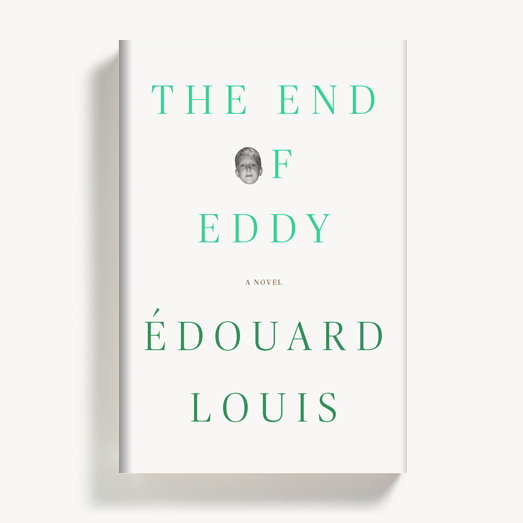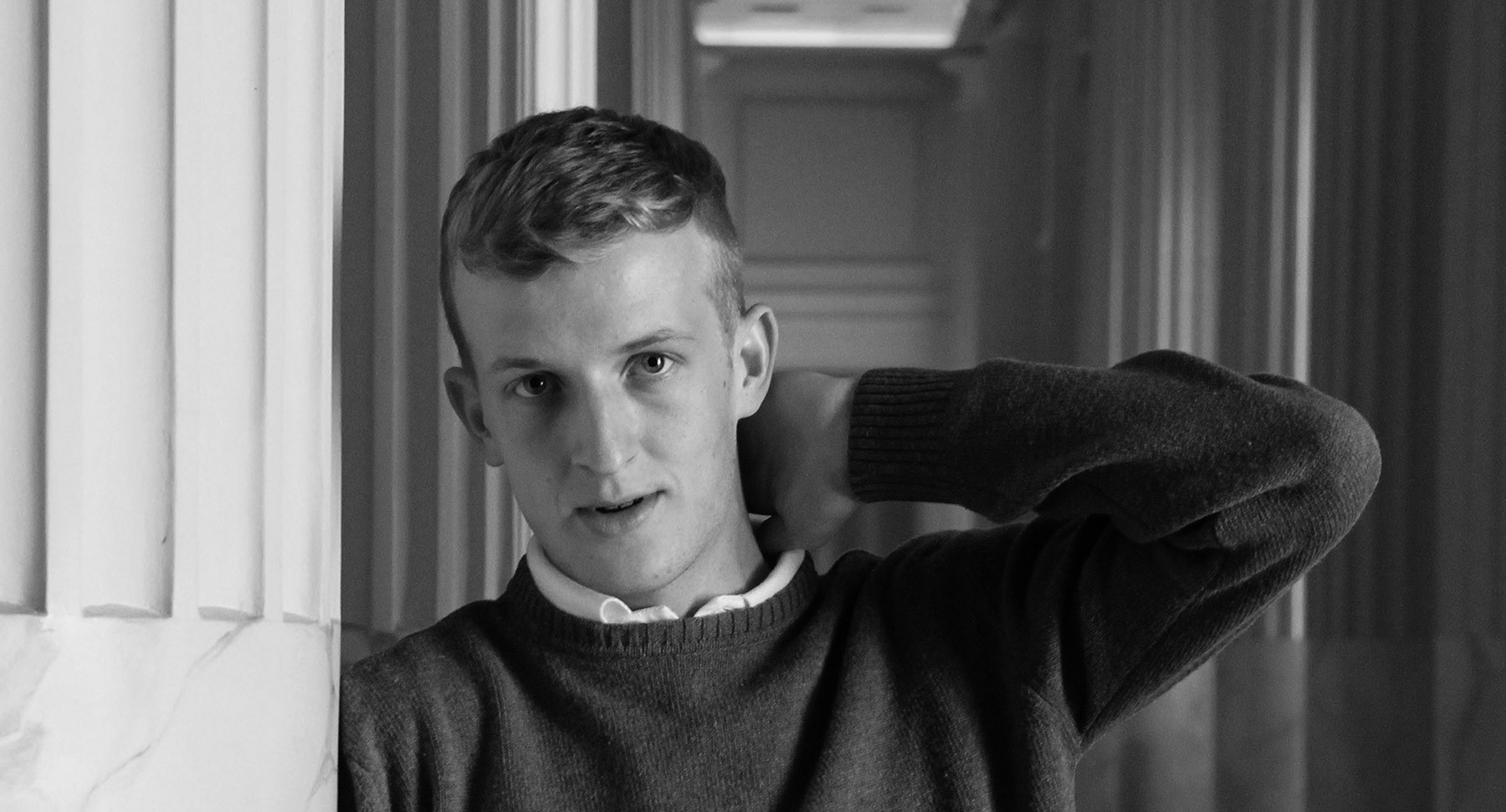
The End of Eddy captures the violence and desperation of life in a French factory town. It is also a sensitive, universal portrait of boyhood and sexual awakening. Like Karl Ove Knausgaard or Edmund White, Édouard Louis writes from his own undisguised experience, but he writes with an openness and a compassionate intelligence that are all his own. The result has made him the most celebrated French writer of his generation.
opens in a new window |
From my childhood I have no happy memories. I don’t mean to say that I never, in all those years, felt any happiness or joy. But suffering is all-consuming: it somehow gets rid of anything that doesn’t fit into its system.
Two boys appeared in the hallway, the first tall with red hair, and the second short with a hunchback. The tall redhead spat in my face How do you like that, punk.
The gob of spit dripped slowly down my cheek, thick and yellow, like the noisy mucus that obstructs the throats of old people or people who are ill, with a strong, sickening smell to it. Shrill, strident laughter from the two boys Look, right in his face, the little pussy. It is dripping from my eye right toward my lips, ready to enter my mouth. I don’t dare wipe it off. I could; I’d only have to lift my sleeve. It wouldn’t even take a second, a tiny movement, to prevent the spit from coming into contact with my lips, but I do nothing for fear of offending them, for fear of making them more agitated than they already are.
I didn’t really think they’d do it. Which is not to say that violence was something new to me, far from it. As far back as I can remember I can see my drunk father fighting with other drunk men leaving the café, breaking noses and teeth. Or, some man having looked too directly at my mother and my father, under the influence, erupting Who the fuck do you think you are, asshole, looking at my wife like that. My mother trying to calm him down Calm down, sweetheart, calm down to no avail. My father’s buddies, who would in the end intervene—that’s the rule, what friends do, what it means to be a real buddy—jumping in to separate my father and the other fellow, the victim of my father’s inebriation whose face was now all beaten up. I would see my father, after one of our cats had a litter, take the newborn kittens and slip them into a plastic grocery bag and swing it against some cement edge until the bag was filled with blood and the meowing had ceased. I had seen him butcher pigs in the yard, and drink the still-warm blood that he was collecting in order to make blood sausage (blood on his lips, his chin, his T-shirt) It’s the best, the blood you get from an animal right when it dies. The squeals of the dying pig as my father sliced its trachea could be heard throughout the village.
I was ten years old. I was new at the school. When they appeared in the hallway I didn’t know them. I didn’t even know their first names, which was unusual in a small school like this one, barely two hundred students and where everyone got to know one another right away. They approached slowly, smiles on their faces, nothing aggressive about them, so that at first I thought they were just coming up to introduce themselves. But why would these older kids be coming to speak to a newbie like me? The schoolyard obeyed the same rules as the rest of the world: the big guys kept away from the little ones. My mother would say much the same thing when speaking about workers Us little folks are nobodies, especially to the fat cats.
There in the hallway they asked me who I was, if I was Bellegueule, the one everyone was talking about. They asked me the question that I would repeat to myself endlessly for months, for years,
You’re the faggot, right?
By saying it they inscribed it on me permanently like stigmata, those marks that the Greeks would carve with a red-hot iron or a knife into the bodies of deviant individuals.
By saying it they inscribed it on me permanently like stigmata, those marks that the Greeks would carve with a red-hot iron or a knife into the bodies of deviant individuals, people who posed a threat to their community. Impossible to rid myself of this. I was shocked, even though it was hardly the first time someone had said something like this to me. You never get used to insults.
A feeling of powerlessness, a loss of balance. I smiled—and the word faggot that was echoing, exploding in my head, went on pulsing within me, matching the frequency of my heartbeat.
I was skinny, so they must have figured that my self-defense capabilities were feeble or nonexistent. At that age my parents frequently nicknamed me Bony and my father was constantly repeating the same witticisms You’re so skinny a breeze could blow you away. In the village, being overweight was viewed favorably. My father and two brothers were obese, as were several women in the family, and people often commented No point in dying of hunger, being fat’s not the worst thing that can happen to you.
(The following year, tired of all the ribbing from my family about my size, I decided to put on weight. I got money from my aunt and used it to buy bags of potato chips after school—my parents wouldn’t have given me the money—and stuffed myself with them. Me, the person who had refused to eat my mother’s cooking when it was too greasy, precisely because I didn’t want to become like my father and my brothers—which would leave her exasperated: It’s not like it’s gonna clog up your asshole—suddenly I would gobble up anything around me, like those clouds of insects that can unexpectedly swoop down and consume whole fields. I put on nearly fifty pounds in a single year.)
At first they just pushed me with the tips of their fingers, not too roughly, still laughing, with the gob of spit still on my face, then harder and harder until my head was banging against the wall of the hallway. I didn’t say a word. One of them grabbed my arm while the other started kicking me, his smile fading, taking his job more and more seriously, a more and more concentrated expression on his face, an expression of anger and hate. I remember: the kicks to my stomach, the pain of my head hitting the brick wall. That’s one part of scenes like this that people don’t think of: the physical pain, the body suffering all at once, bruised and wounded. What people think of—faced with a scene such as this one, I mean: looking at it from the outside—is the humiliation, the inability to understand, the fear, but they don’t think of the physical pain.
The kicks to my stomach knocked the wind out of me and I couldn’t catch my breath. I opened my mouth as wide as I could to let in some oxygen. I expanded my chest, but the air wouldn’t go in, as if without warning my lungs had filled up with some dense kind of sap, with lead. They felt heavy all of a sudden. My body was shaking, as if it had a mind of its own, as if I had no control over it. The way an aging body that is freeing itself from the mind, or is being abandoned by it, refuses to obey it. A body becoming a burden.
They laughed when my face began to turn purple from lack of oxygen (a natural response from working-class people, the simplicity of those who possess little and enjoy laughing, who know how to have a good time). My eyes filled with tears reflexively, my vision became blurred as usually happens when you are choking on saliva or a piece of food. They didn’t understand that it was because I was suffocating that I had tears in my eyes; they thought I was crying. It annoyed them.
I could smell their breath as they got closer, an odor of sour milk, dead animals. Like me, they probably never brushed their teeth. Mothers in the village weren’t too concerned about their children’s dental hygiene. Dentists were expensive and as usual a lack of money came to seem like a matter of choice. Mothers would say There’s way more important things in life. That family negligence, class-based negligence, means that I still suffer from acute pain, sleepless nights, and years later, when I arrived in Paris and at the École Normale, I would hear my classmates ask me But why didn’t your parents send you to an orthodontist. I would lie. I’d say my parents, intellectuals, slightly too bohemian in their outlook, had spent so much time worrying about my literary education that they sometimes neglected my health.
In the hallway, the tall boy with red hair and the shorter one with the hunchback were shouting. Insults came one after the other with the blows, and unfailingly I kept silent. Faggot, fag, fairy, cocksucker, punk, pansy, sissy, wimp, girly boy, pussy, bitch, homo, fruit, poof, queer, or homosexual, gayboy. On some occasions we would pass each other on a staircase packed with students, or in some other place, in the schoolyard. They couldn’t hit me in front of everyone else, they weren’t that stupid, they could have been expelled. An insult would do, just faggot (or something like it). No one looked over, but everyone heard. I’m sure everyone heard it, because I remember the satisfied smiles that would appear on other kids’ faces in the schoolyard or the hallway, from the pleasure of hearing the tall redhead or the short hunchback deliver a sentence, saying out loud what everyone else thought in secret, and would whisper as I walked by, and that I would hear Look, it’s Bellegueule, the homo.
Édouard Louis, born Eddy Bellegueule in Hallencourt, France, in 1992, is the author of two novels and the editor of a scholarly work on the social scientist Pierre Bourdieu. He is the coauthor, with the philosopher Geoffroy de Lagasnerie, of the “Manifesto for an Intellectual and Political Counteroffensive,” published in English by the Los Angeles Review of Books.
YOU MIGHT ALSO LIKE:
In Conversation: Kanishk Tharoor and John Wray
On Translating Emmanual Carrére
In Conversation: Ishion Hutchinson and Teju Cole
